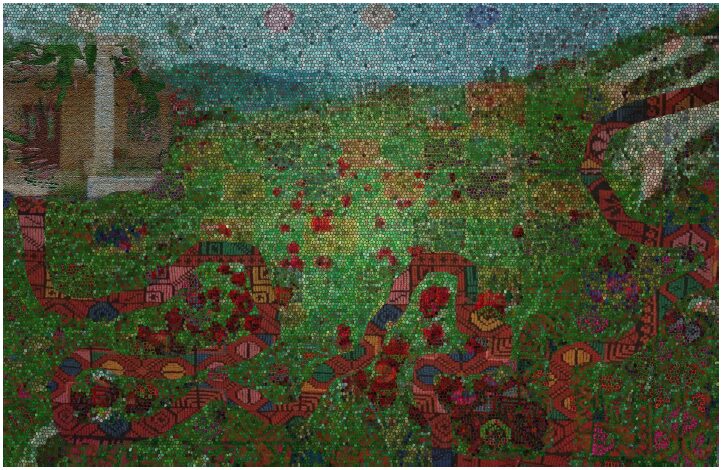“A desolate country whose soil is rich enough, but is given over wholly to weeds… a
silent mournful expanse…. a desolation….” – this is of Palestine by Mark Twain, from his
book The Innocents Abroad, written in 1869.
Dear Mr. Twain
Much like your huck, I lived a carefree childhood, unlike my son’s in these times. But as often as
my parents could, my carefree landscape was obscured.
My landscape begins at my parents’ home, refugees of colonization, across a border
through Palestinian villages and towns, a sliver of the fertile crescent, through deep
pomegranate valleys and layers of ancient histories.
A landscape murmuring with hundreds of waterfalls and springs, rich in ideologies.
A landscape cruelly interrupted.
It is in this cruel interruption that I begin my journey.
Strip-search after checkpoint, through gates in concrete walls snaking over aquifers, and
separating farmlands, separating a culture, separating loved ones.
But this trauma, in the mind of a child, melts away as I reach my ancestral village in Beitummar,
while I ascend Aseeda, a hill, its peak the end of my destination, and the weight of this
dichotomous landscape fades to the faces of my grandparents, the smell of my grandmother’s
taboon, baked outside, infused with the scent of a jasmine crowning their limestone porch, the
voices of welcoming neighbors. It is while ascending a landscape dotted with grapes, peaches,
almonds, figs and plums, wildflowers and traditional herbs that I break down.
From absolute belonging.
I visited your house in my surrogate stomping ground, an alien landscape to me at the time, a
landscape I fully explored, learned the wild pathways of water and forest, I found the old roads
and I learned their histories.
You, you briefly glimpsed a temperate Mediterranean landscape in the dry season and from this
occluded viewpoint you neglected to employ the intelligent and understanding mind that shone
through in so many of your other writings. Constrained by the bible, as a guide with an agenda
narrated my landscape on behalf of my people. You missed an opportunity, painted a skewed
picture that to this day has held strong in the imagination of the people of my son’s birthplace, of
your birthplace, of my current landscape, and like my homeland, a brutally colonized landscape.
This mosaic tells the story of the landscape I experienced as a child, every summer, on my way
from my home in Amman to my grandparent’s house in Palestine. It’s an image of my
grandparent’s house on the left. The path is an image of a Thob, a Palestinian traditional dress,
gifted to me by my eldest sister. The background is a landscape in Palestine, of hills and poppy
fields.
Luma Abu Ayyash Kennedy is a Palestinian living in the United States since 1994. She is an Entomologist, a Plant Scientist, and recently received a second Masters degree in Landscape Architecture. She works as a Research Associate at the College of Design, and a Visiting Lecturer at the Department of Horticultural Science at North Carolina State University. Luma is a mother of a 12 year old and lives in Raleigh with her family where she continues her Palestinian ancestral tradition of farming by tending to traditional herbs, fruit trees and vegetables- her fingers firmly reaching through indigenous soil to her ancestors in Palestine. The clacks of her shovel in rhythm with the clicks of her father’s rosary in Amman. Luma has always found writing as a cathartic process, but has never attempted to publish any of her writings. This short essay was a class project, written in 2020.

